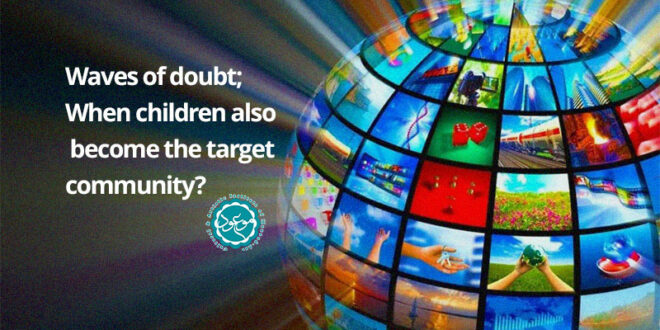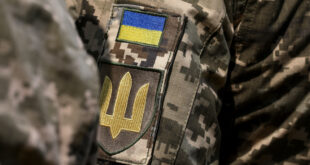Article: Waves of doubt | How do dissident networks become people’s friends? | When children also become the target community?
A media expert said: “In the past, the confrontation of satellite networks with the people was obvious, but today they show themselves to be compassionate and follow the demands of the people, and this is how they pour their poison and open their place at the people’s table.”
Fars News Agency-Media Group: “Waves of Doubt” is a series of roundtables in cooperation with Fars News Agency and Radio Ghoftogoo. In these sessions, the nature, background, goals, and performance of Persian-language media are discussed. In the previous sections, issues such as the nature and intellectual identity of the Persian opposition media, their language and policy, their goals, the behavior of the monarchist media, and the behavior of the Takfiri media against the Islamic Republic were discussed. In this roundtable, with the presence of Dr. Ali Mohammad Esmaili, the editor of Al-Alam news website and senior analyst of media issues, and Dr. Majid Monemi, a university lecturer and media researcher, the issue of satellite war was discussed as follows:
Media and communication with public opinion
Q: How are media outlets that communicate with our public opinion via satellite separable in terms of function or type of activity?
Ismaili: In this area, a new network is opened every day, or something new happens. But the important thing is that since the title of the program is also satellite war, I want to say that all these transmitters are received on mobile phones. There has been a substantial change in the satellite programs form that more or fewer people are aware of, and a kind of division of labor has taken place between these satellite networks. Each satellite network takes on a task, covers a section, passes to each other, and tries not to lose the audience.

Q: That is, in the distribution of work and responsibility is coordinated!
Ismaili: Yes, everything is completely different from the first and second decades of the revolution. In the past, the confrontation of satellite networks with the people was obvious. They insulted and disrespected the officials and ideals of the system, but now their method has changed. That is, first of all, they are very polite and talkatively, they do not seem to be in front of the people and try to stand by them, they enter the field of political issues less and more in the social strata and the same issues that people are dealing with.
They pay attention. You see people talk about issues and problems permanently, whereas in the past their focus was on subversion and harsh political rhetoric. Nowadays, anyone who does not know where a satellite network belongs can hardly tell if it is a satellite network or one of our own!. They tried to make themselves look like us and like the common discourse of our country, and this is how they shed their poison and make their place on the people’s table.
Q: How can it be divided into genres and the so-called gender and attention of satellite networks to different topics?
Monemi: Today we have something called Media Sphericity. This means that anyone can access any content at any time and in any format. Satellite networks also have their function in the media sphere. That is, a strong satellite network continues to operate, and a social network does. Foreign televisions and radios do their work in unison. Of course, there are different genres that, if we want to categorize, we can say that almost everyone has identified and assessed the needs of the audience. According to that, they prepare and distribute the content.
Q: They even play cartoons!
Monemi: Yes, I am going to point out that in the field of satellite networks, there are now several channels in the field of film and series, music, sports, children, which are the same as cartoons and animation, and so on. There are special networks.
But what function each of these networks pursues is another matter. Each has a headline and requires a long discussion. But I want to say that even a sports network falls into this category, while the audience of such networks may think to themselves what a negative impact a sports network might have! Yes, at first glance it may not seem to have a negative effect, but it has an effect during the programs that are broadcast. Let me give you an example; For example, wrestling competitions are shown. Well, it has an appeal that stems from American culture ; this is attractive to a teenager. He says when he grows up, he wants to choose this job.
Satellites, methods and techniques
Q: In fact, what methods and techniques do the mentioned satellite networks use?
Ismaili: In the first stage, these networks need to retain the audience, which means that when you enter a supermarket, you see that everything from dairy, beans, and detergents, and in short, everything is found in it, because it does not allow you to buy from anywhere else. So are satellite networks. They reach out to the audience and try to provide all the media needs of a family.
As mentioned, cooking programs to sports programs exist in these networks! That means you see fewer political agendas. There are hints in some places, but it is designed to have everything a family needs, including news, analysis, contests, and cooking programs. Maybe we now have about 50 satellite channels that broadcast cartoons, and this cartoon that is being broadcast has been dubbed in Persian.
Well, the image quality is also very good, and every effort is to prevent people’s receivers from going to internal networks. Naturally, when families are full-time consumers of satellite networks, in my opinion, it is a kind of citizen of that country. That is, when his news connection with the system cuts off, he takes his news and analysis from there.
He only refers to the local media to find out, for example, whether it is closed tomorrow or not. It is the biggest damage that inflicts the whole matter. We should change the discussion to what should be done in such situations as soon as possible? It does not help much to explain the problem. All you have to do is look at the rooftops and the dishes around us to see how effective the satellite networks are.
Unfortunately, the country is also involved in political and economic issues and livelihood issues. I do not see much in different circles, whether public, private or academic, to address the cultural effects of satellite networks. Not only is there a monopoly on cultural influences, but you can also see the satellite channels’ effect on people’s participation in elections. For this reason, I believe that this issue should be addressed more than this and taken seriously.

Satellite warfare
Q: Can we use an expression similar to that of being at a stage of satellite warfare?
Monemi: I say we need to talk a little more up-to-date. The same discussion of becoming a Media Sphere that I mentioned at the beginning of the petitions was related to this issue. Not just satellite war, I would say this is an expression that is at least repeated among the media but not too repetitive among the general public. This is a soft war, in which all the tools we have are around the media, one of which is satellite. Satellite, with its special function of audio and video, affects the mind of the audience, and their text and message have another effect.
If we consider the term soft war and continue the same path, all of them will lead to a special functioning, that is the taste or priorities of the audience change. If it happens, someone will have geography without conflict, war, or military force. Now it’s the title of satellite war program, but when we want to expand the scope of this a little bit, we will have to follow the discussion of Soft War, which can be discussed in related spaces, such as the Soft War in economics, politics, culture, social issues, in all of which media tools have an impact, one of which is satellite.
Arabic language networks goals
Q: Do the Arabic language networks communicate with our people and work with a similar aim as Persian language networks?
Ismaili: Yes, in parallel with the channels that work in Persian, the Arabic language channels also work for their own audiences. But I feel that Persian-language networks are the most influential in our country, so right now about 300 Persian-language networks can be downloaded in our country, all of which can also be downloaded via mobile.
Monemi: On the subject of children’s satellite channels, an Arabic network broadcasts a cartoon called “Children”. Now I do not want to make a direct reference, but they have named a sheep after one of the great men of our religion. This means the destruction of Islam! Only if we want to look at the discussion of the revolution can we bring this discussion to a more general paradigm because the Islamic Revolution has become the banner of the spread of Islam in the world; Originating from the order of Imam Khomeini from the advent of the revolution, the main reason for their opposition to the revolution is that the Islamic Republic has a flag.
Now they consider those higher levels and from there they start Islamophobia and anti-Islamism. In my opinion, Arabic-language channels follow the model whose final headline in Persian-language channels is a direct confrontation with the Islamic Revolution, from the young people living in Iran who are children to the higher levels who are now older. Engage we can consider.
Children, youth, and women are three groups that should be given special attention and special planning for them in order to get a good outcome. I have been following various articles in this regard, many articles have been produced, many discussions have taken place, but it is important to bring it into practice, in which I think we have a little problem.
Ismaili: In the discussion of soft war, it is said that we have been attacked, in fact, it is a stream of psychological operations and cultural aggression that has been formed against us. But I want to say that maybe in a sense we were the ones who started this war. In 1978, when the Islamic Revolution took place in our country, in fact, a rift was created in the hegemony of the Western current, which was the flag bearer of this attack of the Islamic Republic.
That is, from 1978 until now, all liberation movements and currents that have been formed against Western hegemony, all political currents have been moving towards human standards and freedom-seeking in a way, all of which are a kind of inspiration from the Islamic Republic. You do not just look at the countries around us, you see everywhere, even Latin American countries. In these countries that I mentioned, when they realize that you are Iranian, they will soon ask questions that you will only realize where the value of the Islamic Republic and the position of the Islamic Republic are.
It was a perfect war that we started and they went on in parallel, the only thing that happened was that in the process of this war, we had a lot of ups and downs. That is, we ourselves did not believe that we were in the middle of a full-blown battle and that we should use our full potential. But the other side received this very soon.
That is to say, the enemy has come to the middle of this battle with all its horror and is attacking from all sides, using all its capacity, using its best, but we have not yet recognized the media war as we should and perhaps have. You now consider the number of networks operated by the Islamic Republic in Arabic or English, it is not comparable to the other side at all and no balance is seen.
Monemi: Physically, it has a strange argument.
Ismaili: Yes. Of course, this story started a long time ago, in fact, they closed the domains of our networks. Well, this is a sign, it shows that we went the right way and this war is getting more serious and the enemy has been forced to use this technique against the rules of the game and hit our nets. That is why this thinking, which is being pumped through the Islamic Republic to the whole world, is the thinking of women, the overthrow of the capitalist system, and all the questions that the world is asking can be answered by the Islamic Republic.
Q: It can be said that just as in the imposed war, we were apparently the only one against Saddam’s regime, but almost the whole world was against us. ?!
Ismaili: Exactly. In classic wars, too, when two countries line up against each other, commanders first examine what the enemy has. First of all, the reconnaissance forces go and calculate the enemy’s equipment, the number of divisions, the number of fighters, the armor, all of them, and in accordance with this line made by the enemy, they stand in front of it and prepare their trenches, arrange their men and the war continues.
I think it’s a good discussion, it’s time for us to see how much power our enemy media has put into this war, how many networks it has, how many Internet sites it has, how many radio networks it has, and how many we have? How influential we are and how influential they are! How many soft war officers do we have, how many trained forces do we have, how many trained forces does the other side have?
If a person enters this war in our country, does he/she want to register as a volunteer and say that we want to take part in this media war; you see what obstacles he faces. You assume that someone has a media plan, now it may be a series, a telefilm, or a movie, or whatever it is, or does a site design at all, has a lot of problems to be able to line up Introduce.
While this does not make sense, we must now open our gate and bring to work all those who are interested in this media war against the enemy. Fortunately, good things have happened and I do not want to say that our hands are empty. Different companies are working, but this is not yet commensurate with the hegemony of the enemy. That is to say, the extent of our influence clearly depends on the amount and capacity that we have prepared for this war.

The influence of media on public opinion
Q: Naturally, one of the reasons for the background of foreign media is the situation that arises inside the country. Some of these conditions may be the result of natural disasters, and some may be the result of inefficiencies and other issues that we all deal with. But the fundamental question is, in the realm of news, what methods do the media we are now discussing, namely satellite networks, typically use to influence public opinion?
Monemi: There are different techniques in this area. That is, hostile media or any media that in the field of soft power, wants to have an impact on a society and its purpose and audience; Uses different techniques. Now I will mention a few of these issues.
One of these techniques is to induce social indifference through the use of false statistics and information that the audience does not have access to. For example, the fact that we have several power plants, where this amount of electricity generation is used, these are vague statistics and information, part of which may be strategic information that not every government publishes.
A section may be broadcast, but not everyone has access to it, and that news network comes up with the same statistics and information that not everyone has access to, and at a particular point in time becomes valuable to the audience, abandons it, and uses it in some way, to confuse the audience and to create a misunderstanding of the story. That is, the general public who are involved, for example, in the issue of electricity, engage in a concern for which there is no answer and which creates a rift between the people and the government and the government.
Another technique that can be mentioned in the discussion of highlighting. That is, the media highlights issues. There is a saying that the media can determine how you think. He cannot say what to think, but he can suggest how to think. If I give an example of this, for example, the discussion of the presence of women in the stadium; we put aside all the issues that can pave the way and pave the way for improving people’s lives in the community, and the presence of women in the stadium becomes a priority.
I am not saying that this is an issue that should not be addressed but should be expertized and discussed, but it is not our first priority. A disobedient medium, because it can now make the impression that the audience has another priority, comes in and adds a theme to it and highlights it, thereby changing the taste of the audience. Now he can summon other works and raise other issues.
Another widely used technique is the rumor mill. Gossip has a higher coefficient in cases where the audience needs more information about those cases. For example, we are now suffering from the Covid-19 pandemic, and the issue of vaccines is a vital issue for most people, and everyone is following it.
But because this need is not met by the dissemination of accurate information, the atmosphere of rumors is created and causes those media outlets to achieve their goal, that is, the opposition media use this opportunity and give the news to the people who are waiting for news. They inject the poison and get their desired output.

Media and rumors
Q: What kind of profession is gossiping about? Because spreading rumors ultimately damages one’s own credibility.
Monemi: Rumors can be asked in the form of a question. The BBC, for example, is very professional, that is, it pretends to be sympathetic and supportive, it gives some statistics and information, and it asks if, for example, you have received the vaccine? Why did you not get the vaccine? Questions that occupy the mind of the audience.
Those who have not received the vaccine are also invited, for example, to send them a video with their phones from the vaccine queue to follow up, and… that is, they act from a position as if they want to pursue your rightful claim. First, they put the demand in the right place using the techniques and then they say that I can respond to your demand with my repeated follow-up.
They create a need and say if you want an answer to that need, contact us. It both increases its audience and in a way introduces itself in the position of following the demands of the people. Therefore, rumors are spread this way. It is true that the source of the rumor usually damages its own credibility, but those techniques have changed and finally been updated, and a rumor-making system has been developed that can have both a claim and a responsive function.
Q: What are the limitations that dominate this unequal war? Because space itself is one of those places where they dominate. This means that when you try to put a satellite in orbit, you face a thousand problems and difficulties and it has limitations or they close your hand.
Ismaili: I want to tell you that the world media ecosystem has changed. The situation is completely different from previous decades. It is true that the enemy can now easily convey his message to our people, but we can also use the channels of communication provided now.
But unfortunately, we do not make good use of these existing channels. In the classic war, when mortars explode somewhere, a cannonball hits somewhere, someone is shot, and other soldiers were not allowed to pursue their work or ignore and be indifferent, which is the same in the media war. When you wake up one morning, you see that a clip, a message has been widely circulated, it is like a cannonball that has been released and there are definitely a lot of cracks and a number of injuries.
Now, these wounded do not necessarily bleed for you to see, but they are intellectually one step away from the system. That is, there is a suspicion in his mind that I think his injury is actually more dangerous than the one who was shot directly. It is obvious that the person who has been shot is bleeding and you are taking him to the hospital to be treated, but this person, who has now been hit by this suspicion, did not write on his forehead that you should take him together to treat him or answer him.
So we have to move our mechanism to observe if somewhere a bullet explodes and definitely a viral message, the sign is that when you get a message on your mobile phone, a clip of two people, three people, four people sent you a separate source, you can be sure that it has exploded, that is, it has spread. What should we do? Should we sit and watch?
To say that the ecosystem has changed and that we have not yet observed these changes well is because we used to use the boycott technique when something happened. We used to say that now the BBC or the Voice of America has said something, but you do not talk about it at all until it passes or, for example, the damage is less. That time has passed. That is, now the atmosphere is such that if such a package is released, which is inevitable and you cannot stop it, you must immediately treat the injured.
The easiest way to treat it is to be transparent. That is, when, for example, one of the satellite channels comes and broadcasts an image that there is a failure in a certain area, you have no choice but to have your reporter stationed, take a picture of the same event and the relevant official comes and responds; what is right and what is wrong. That means you can no longer hide.
You cannot say that God willing. You need to be transparent. If the mistake was made by our own officials, the wrongdoer must be dealt with. If it was not really a mistake, they may have used an archival image, but you should still date that image and say, for example, that the image that was broadcast by a satellite network belongs to three years ago or does not belong to our country at all.
Monemi: Part of this is from the government or the responsible agencies, and part of it is the discussion of serious media literacy education to the general public. We have distributed the word media literacy in our minds, but its content has not been properly distributed. What does media literacy mean? What does it do? What kind of help? What are they talking about?
Ismaili: It also has its own story. We now have a media literacy textbook and it is also taught in schools, but in fairness, we do not have a media literacy instructor. It is not possible to tell a sports teacher or a science teacher to teach media literacy. I have seen in many schools that even the school service staff is offered to teach media literacy. While the book is a very heavy book . A simpler version of this book should be taught in elementary school.
Monemi: Yes, because now we say we have a children’s network. In our own family, for example, my daughter, who watches a program that is also broadcast on the internal network, has become so sensitive that she says that this is what Baba meant. I say do not spread media literacy in your mind so much now. But I want to say that this analysis is important.
It requires both the right mechanism and the right tools. One of its tools is the point that Dr. Ismaili made, that is, teaching media literacy that has not been taken seriously.
Ismaili: Once upon a time, there were two dog and pet food shops in Tehran. But today these two shops have become twenty shops. What is this sign? The sign is that the number of people keeping a pet at home has increased. That is, the lifestyle has changed. One of the reasons is that almost all the cartoons we play for children show dog care.
I have no enmity with dogs, do not be mistaken, But an Islamic family is different from those who have an emotional need to keep a dog. After that, we come to our parks and sign that dogs are not allowed to enter. That is, we are going the wrong way. That is, we try to take a more costly path in many cases, rather than dealing with the root cause and seeing where the damage is coming from.
Waves of doubt
Q: We have a short audio package that is the conversation of the host of Iran International TV channel with one of the directors of Persian-language channels who say that they have not been successful. We also do not want to be too optimistic. In other words, in the expert discussion, there is no place for these discussions to say that they all failed and had no effect.
Consequently, this is not the case, but in any case, factors such as the resistance of the people, the crossing of the revolution over the age of 40 and the problems we had and overcame in any case, and the values that remain and are respected, show that they ultimately could not achieve the goals What is the reason?
Monemi: Let me tell you that there are a series of things that are part of the capital or, in other words, part of the soft power of the Islamic Republic, which has prevented the opponents from reaching the result. One of these is the discussion of Islamic ideology that has been answered. In 1957, the famous French philosopher Michel Foucault watched the situation closely.
He acknowledged that the main driver of this movement was spirituality. This spirituality is doing its job. Example If I want to say that a delegation is held in the month of Muharram and you see different people from different walks of life come with different tastes and thoughts, whatever they know, they spend the cost of this process. This is a matter of spirituality. Or you see the discussion of the bravery that exists. Again, if I want to give an example, at the funeral of Haj Qasem Soleimani, you saw what happened in our own Tehran.
I do not go to other cities. There were floods of people of all kinds if you were there. People are in trouble, but they play their part in the times. These are the facts that have prevented the opponents from reaching a conclusion. We hope that in the end, we will be able to shape that final step, the new Islamic civilization, God willing, which is our ultimate goal.
Ismaili: Since I have little time, I just want to point out that we need to talk a little bit about media zeal. That means we have to be more responsive to our audience and not let our audience go and buy from the enemy supermarket. It is important for us if we see that the number of contacts in a satellite network is increasing. As we poll on various topics, let’s see how far our audience is going, buying from the enemy supermarket, and why they are leaving. We have no choice and we have to go two ways.
One, the efficiency of the system must increase day by day. That is, when a wound occurs, flies and pests come naturally and sit on the wound and infect it. We must not allow wounds to form. When there is a shortcoming in a part of the country, in one of the provinces, in one of the government departments, this must be corrected.
 Mouood Mouood English Edition
Mouood Mouood English Edition




